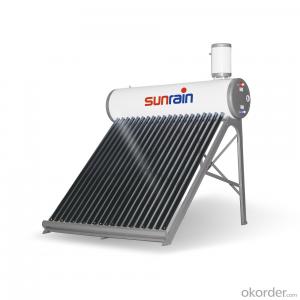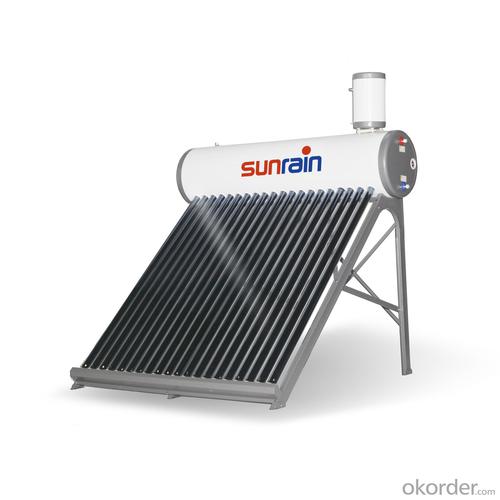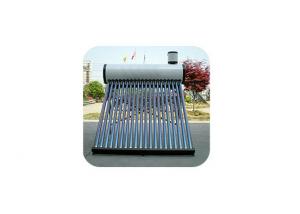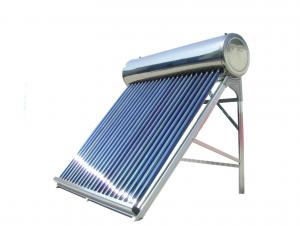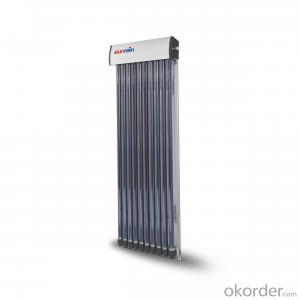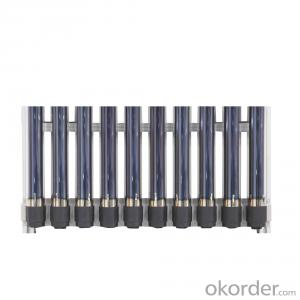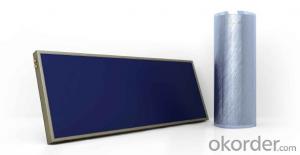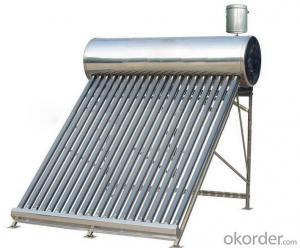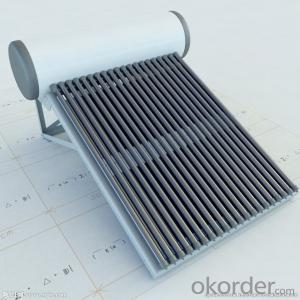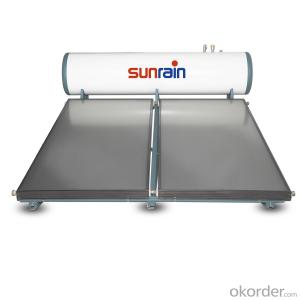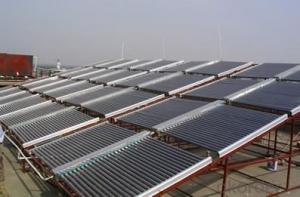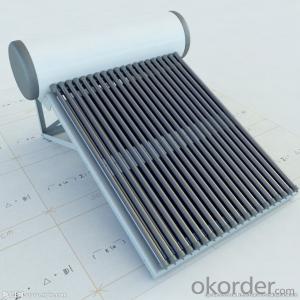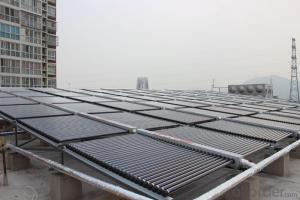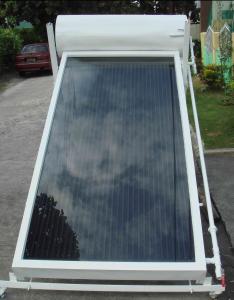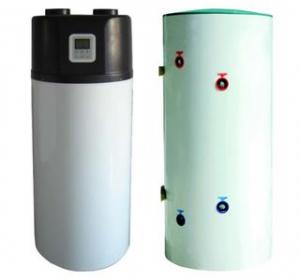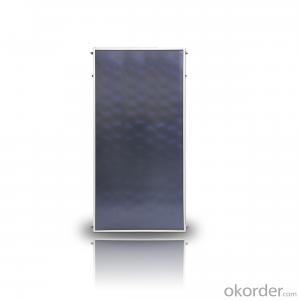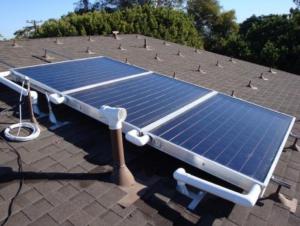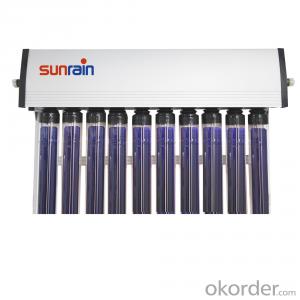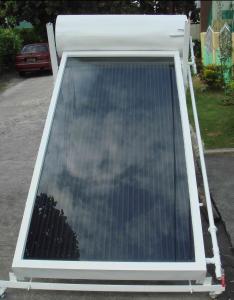Non-Pressure Solar Water Heater Collector
- Loading Port:
- China Main Port
- Payment Terms:
- TT OR LC
- Min Order Qty:
- -
- Supply Capability:
- -
OKorder Service Pledge
OKorder Financial Service
You Might Also Like
* Frame: coated galvanized steel, special triangle design, strong and practical.
* Using professional test system including equipment imported from German to guarantee the quality of the whole solar system.
* Different specifications to meet the requirement of different building conditions. Easy installation, small area
* Environmentally friendly, small investment with huge payback. Flexible combination and convenient operation according to customers' requirement help to reduce the cost. It only takes 3-5 years to recoup the cost and is long-term beneficial. More economic that gas and electric heating system
* Natural circulation without pumps. More economic
* Suitable for big project, more widely used in school, office, manufactory factory, breeding room, electroplating factory, fermenting factory, food factory and other hot-water-needed factory.
* The heat exchange efficiency of U pipe collector is better than that of heat pipe.
- Q: Can a solar water heater be used in areas with limited tidal power resources?
- Certainly, solar water heaters are suitable for use in regions with limited access to tidal power resources. Tidal power, which captures energy from ocean tides to generate electricity, is a renewable energy source. However, its function is not directly tied to the operation of a solar water heater. A solar water heater utilizes the sun's energy to heat water for various purposes, such as domestic or industrial use. It comprises solar collectors, which absorb sunlight and convert it into heat, and a storage tank for storing the heated water. These systems are typically designed to function optimally in areas with abundant sunlight. Unlike tidal power, solar energy is widely available across most parts of the world, regardless of proximity to the ocean. As long as an area receives an adequate amount of sunlight, a solar water heater can be effectively employed. Thus, the presence or absence of tidal power resources does not affect the feasibility of utilizing a solar water heater. In fact, in regions with limited access to tidal power resources, solar water heaters offer an excellent alternative to conventional water heating methods that rely on non-renewable energy sources. By harnessing solar energy, these systems can significantly reduce dependence on fossil fuels, lower carbon emissions, and generate cost savings on energy bills. Therefore, while tidal power is an exciting renewable energy source, its availability does not determine the practicality of using a solar water heater. Solar water heaters are versatile and can be employed in areas with limited tidal power resources, as long as they receive sufficient sunlight.
- Q: How does the cost of a solar water heater compare to a traditional water heater?
- The cost of a solar water heater is typically higher than that of a traditional water heater. While the initial investment for a solar water heater may be higher, the long-term savings and benefits can outweigh the additional cost. Solar water heaters use energy from the sun, which is a free and renewable resource, to heat water. This means that homeowners can save significantly on their monthly utility bills by reducing their reliance on expensive electricity or gas. Additionally, solar water heaters have a longer lifespan compared to traditional water heaters, resulting in lower maintenance and replacement costs over time. Furthermore, installing a solar water heater may make homeowners eligible for various tax incentives or rebates, further offsetting the initial cost. Overall, although the upfront cost may be higher, the long-term savings and environmental benefits of a solar water heater make it a cost-effective and sustainable choice.
- Q: Can a solar water heater be used in areas with limited access to pellets?
- Yes, a solar water heater can be used in areas with limited access to pellets. Solar water heaters utilize energy from the sun to heat water, eliminating the need for pellets or any other fuel source. Therefore, they are a suitable and sustainable option for areas with limited access to pellets or any other type of fuel.
- Q: Can a solar water heater be used to heat water for industrial purposes?
- Yes, a solar water heater can be used to heat water for industrial purposes. Solar water heaters utilize the sun's energy to heat water, and this heated water can be used for various industrial applications such as cleaning, processing, or heating in manufacturing facilities. The scalability and efficiency of solar water heaters make them a viable option for industrial water heating, offering cost savings and environmental benefits.
- Q: How does the efficiency of a solar water heater compare to a traditional water heating system?
- The efficiency of a solar water heater is generally higher than that of a traditional water heating system. Solar water heaters use sunlight to heat the water, which is a renewable and free energy source. On the other hand, traditional water heaters typically rely on fossil fuels or electricity, which can be costly and have a negative impact on the environment. Additionally, solar water heaters have advanced technologies and insulation that help retain heat, thus reducing energy consumption and operating costs. Overall, solar water heaters are a more efficient and sustainable option for heating water compared to traditional systems.
- Q: What is the expected performance of a solar water heater at high altitudes?
- The expected performance of a solar water heater at high altitudes can vary depending on several factors. Generally, solar water heaters tend to perform well at higher altitudes due to the increased intensity of sunlight, which can compensate for the potentially cooler ambient temperatures. However, the efficiency of the system may be slightly reduced due to lower air density and atmospheric pressure. Additionally, it is important to consider the impact of colder temperatures and potential snow accumulation on the system's overall performance. Proper insulation and system design can help mitigate these challenges and optimize the expected performance of a solar water heater at high altitudes.
- Q: Can a solar water heater be used in areas with limited coal availability?
- Yes, a solar water heater can definitely be used in areas with limited coal availability. Solar water heaters utilize the energy from sunlight to heat water, eliminating the need for traditional fuel sources like coal. They consist of solar panels or collectors that absorb sunlight and transfer the heat to water, which is then stored in an insulated tank for use. As long as there is ample sunlight in the area, a solar water heater can be a highly efficient and eco-friendly alternative to coal-powered heating systems. In fact, areas with limited coal availability can benefit greatly from solar water heaters as they provide a sustainable and renewable source of hot water without relying on fossil fuels.
- Q: Can a solar water heater be used in areas with high levels of snowfall?
- Yes, a solar water heater can be used in areas with high levels of snowfall. However, it may require additional considerations and adaptations to ensure its optimal performance. Snow accumulation can obstruct sunlight, reducing the efficiency of the solar panels. Therefore, it is important to position the solar collectors at an angle that allows for the shedding of snow or install a system that automatically melts and removes snow. Additionally, insulating the pipes and water storage tank can help prevent freezing. Overall, with proper planning and maintenance, solar water heaters can still be effective in snowy areas.
- Q: What is the impact of water quality on the performance of a solar water heater?
- The impact of water quality on the performance of a solar water heater is significant. Water with high levels of minerals, such as calcium and magnesium, can lead to the formation of scale deposits on the surface of the solar panels and pipes. This reduces the efficiency of heat transfer and can ultimately decrease the overall performance of the system. Additionally, water with high levels of impurities or pollutants can cause corrosion and damage to the solar water heater components, further impacting its performance and lifespan. Therefore, maintaining good water quality is essential for optimal performance and longevity of a solar water heater.
- Q: Can a solar water heater be used in areas with extreme temperatures?
- Yes, a solar water heater can be used in areas with extreme temperatures. However, the effectiveness and efficiency of the solar water heater may vary depending on the specific climatic conditions. In extremely cold temperatures, the system might require additional insulation or antifreeze components to prevent freezing. Similarly, in extremely hot temperatures, the system may need proper ventilation or cooling mechanisms to avoid overheating. Therefore, it is essential to design and install the solar water heater appropriately for specific extreme temperature conditions.
Send your message to us
Non-Pressure Solar Water Heater Collector
- Loading Port:
- China Main Port
- Payment Terms:
- TT OR LC
- Min Order Qty:
- -
- Supply Capability:
- -
OKorder Service Pledge
OKorder Financial Service
Similar products
Hot products
Hot Searches
Related keywords
